Sleep more!
Do you get enough sleep?
Did you know that even one night of sleep deprivation weakens your immune system?
There are a ton of other reasons why you must sleep as much as you need. For example:
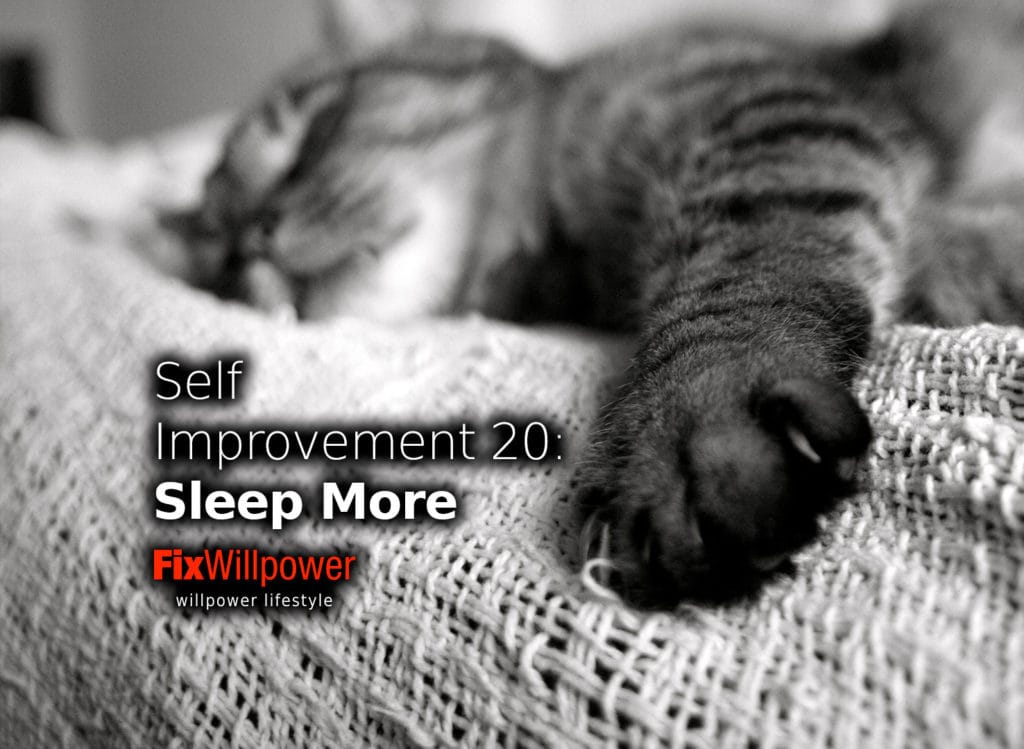
- Sleeping makes you learn better.
- Sleeping helps you lose those extra pounds.
- Less than 5 hours of sleep decreases testosterone.
- Too little sleep makes you sick.
- Not enough sleep makes you emotionally unstable.
- No sleep makes you less alert.
- Not sleeping will degrade your performance.
- No sleep makes you stupid.
I will give you an overview of why you need to sleep more and 17 tips you can implement to improve your sleep quality. I also added some sleep quotes from history.
17 Tips How to Sleep Better
Here are top tips that help you get to sleep faster and sleep more. These points also answer the question of how to wake up earlier?
If, after implementing the tips, you still lack sleep, then you might what to consult a medical professional.
Bedroom environment to sleep more
Don’t live in your bedroom. Your bedroom is for sleeping.
Sleep is so important you should only do sleeping related activities in your bedroom (with one exception). “No gadgets” should be one of the most important rules. Maybe a little bit of reading is allowed. If you live and sleep in the same room, make sure that the bed is only for sleeping.
1. Switch off
Digital screens can make your brain think it’s still daytime, and it should stay alert. Take some time to get away from your gadgets and stop watching TV. Turn everything off an hour or at least 30 minutes before your bedtime. Put away all the items that emit light in your bedroom or cover them if you can’t turn them off.
2. Dim the lights
Turn off the more intense light sources in your home 2 or 3 hours before you want to go to sleep. When you read before you go to sleep, then use a low-intensity yellow light.
3. Silence is golden
It depends on where you live, but try to get the ambient sound level in your bedroom as low as possible. Consider the noise levels when you are buying or renting a home. With too much noise where you can’t avoid it, use the earplugs.
4. Be cool
Find the right temperature for your bedroom. Experiment with the room temperature. Lower temperatures are usually better for bedrooms and sleeping. Try 64 to 70F (18 to 20C) range. Sometimes, air conditioning may be noisy, and you have to choose between a cooler or quieter room.
5. Darkness
Melatonin helps you sleep. It’s produced in the darkness. Make your bedroom dark. If your neighborhood has a lot of street lights or other light pollution, get special sleeping blinders (for your eyes or windows or both). Turn off all the glowing and illuminated items in your bedroom.
As a medicine, melatonin is used to treat insomnia; One review found onset of sleep occurred 6 minutes faster with use but found no change in total time asleep. Insomnia: Pharmacologic Therapy
6. Sleep and sex only
Make your bedroom a sleep and sex room. Avoid doing everything else in your bedroom. Anything means:
- No watching TV in the bedroom
- Remove the TV from the bedroom
- No phones and computers in bed
The bedroom is for sleep and sex. And books.
For example, if you can’t sleep for some time, get up and read in another room. Then come back.
The bedroom is for sleeping!
7. No dogs, cats, alligators
People sleep in people’s beds. Pets sleep in their own beds. When pets sleep in your bed and move around at night, then this may cut your sleep short. Of course, this is also true about human companions, but you would probably like to keep the current arrangement.
8. Don’t look at the time
Do not have a visible clock on your nightstand. Often, it emits light. When you look at your phone, then you’ll be almost blinded. Just don’t do it. It’s better to leave the phone in the other room, anyway.
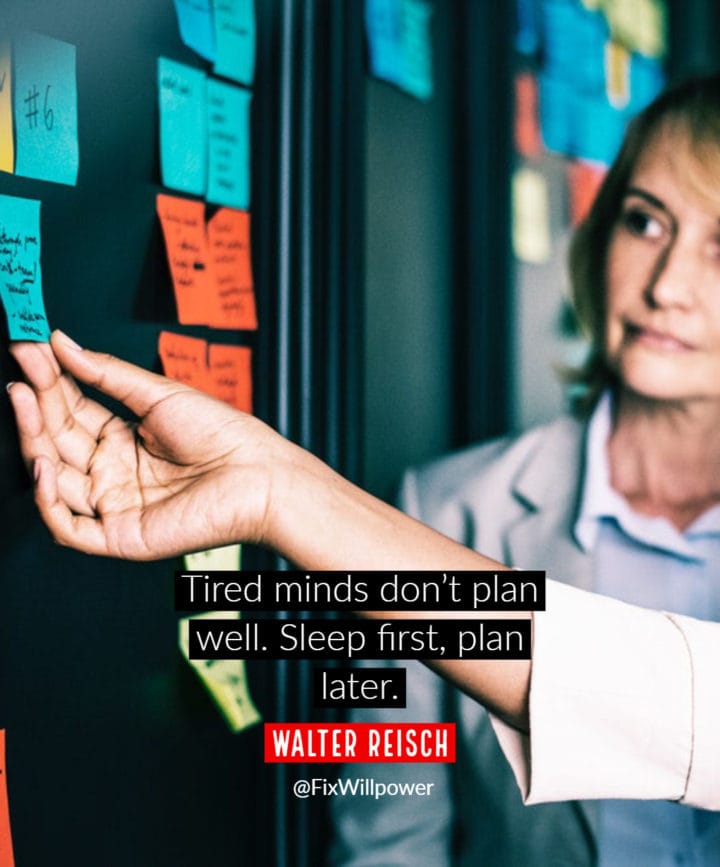
Tired minds don’t plan well. Sleep first, plan later – Walter Reisch
Routine to Sleep More
How to fix your sleep schedule?
Do you know Pavlov’s dogs? When he rang a bell, they started salivating. Condition yourself in a way that when you go to the bedroom, the routine kicks in, and you get to sleep. It takes time to establish a routine, but it’s well worth it. Take a 30-day challenge to build your evening routine.
9. Build a regular sleeping schedule
This is the most important piece of sleep advice!
Train your body to follow the daily rhythm and go to bed every day at the same time. Set your alarm at the same time every day. When you are training your brain with the new schedule, then wake up at the same time, even on weekends. You can allow some variety after you have built a solid sleeping habit.
If you only do one thing to improve your sleep, do this!
10. Create a power-down routine
Try to get all the noise out of your head.
Work and life problems that you focus on may create mental noise that you can’t shut down easily. It may take special steps to quiet the voice in your head. Writing down what you have to do the next day may help to get some closure for the day. Meditate, yoga, take a warm bath, and listen to relaxing music. Start your winding down 2 or 3 hours before bedtime, but even 10 or 20 minutes of relaxing will help.
No Stimulants
Don’t use substances that make you alert and energetic. Depending on how easy it’s for you to go to sleep, consider avoiding anything that prevents you from sleeping for at least several hours before bedtime.
11. No caffeine
No caffeine 6 hours before bedtime – You can have your coffee in the morning. Have as much as you want, but stop 6 to 10 hours before your bedtime. If you want to go to sleep at 11PM, then you should have your last cup of coffee no later than 4PM. And even that seems a bit too late. 3PMish, maybe.
12. No alcohol
Don’t drink alcohol before bed – alcohol acts as a stimulant. When you drink, before going to bed, you will have a lower quality of sleep. You may also wake up at night more often than usual. As you are trying to fix your sleeping habit, you should not drink at all. At least cut it to a minimum.
Or you may start drinking in the morning so the alcohol has time to leave your body before you go to sleep. (This is a joke.)
13. No smoking
No smoking before bed – nicotine like alcohol and caffeine is a stimulant. You don’t have to quit smoking but leave an hour or two between your last cigarette and sleep time. Quitting smoking is one of the best willpower exercises, and it comes with a ton of other benefits. So, if you can quit smoking.

Though sleep is called our best friend, it is a friend who often keeps us waiting! ~ Jules Verne
No Eating and Drinking
14. Don’t eat just before bedtime
Try to finish all your eating and snacking at least an hour before you go to bed. Avoid foods that take a long time to digest. For example, you can have an apple an hour before bedtime.
15. Don’t drink a lot before bed
Avoid large quantities of any drinks before you go to sleep. Half a glass of water is OK, but if you drink more, you might wake up for the bathroom. After that, it may be hard to get back to sleep.
Other tricks that may help
There are many things that may help you get to sleep faster. Experiment with different options and keep the ones that help you sleep more. For example, I drink a large cup of peppermint tea with honey 30 to 60 minutes before I go to bed.
16. No naps
Try not to sleep during the daytime. Yes, there are power naps that can energize you if you feel tired, but you will do it at the expense of your night’s sleep. When you are exhausted, go for a walk, drink ice water, or call a friend. You can walk while talking to a friend on the phone and sipping ice water from the bottle.
Important!!! When you drive a car, and feel tired, take a nap! It is extremely dangerous to drive if you feel sleepy.
17. Exercise
Working out will help you sleep better. I already mentioned walking. Walking is all you need, but if you do something more active, then aim to complete your workout session at least one hour before bedtime.
How to implement these tips in your life
Some suggestions above are easier to follow than others. Think about it and decide on at least 3 things that you can do to improve the quality of your sleep. After you have created those habits, take another three, and continue until you reach 8 hours of uninterrupted sleep every night.
Video: Sleep Experts Debunk 15 Sleep Myths
Two sleep experts debunk 15 of the most common myths about sleep. They explain that boredom, alone, doesn’t make you tired and that you should get out of bed if you can’t fall asleep. They also debunk the idea that loud snoring is nothing more than annoying. It’s often a sign of a severe sleep disorder that can seriously compromise your sleep.
When you understand the sleep myths, then you have a better grasp on how to improve sleep:
00:35 Watching TV in bed is an excellent way to relax before bed.
00:59 Drinking alcohol before bed improves sleep.
01:47 Lying in bed with your eyes closed is almost as good as sleep.
02:52 If you can’t sleep, you should stay in bed and try to fall back asleep.
03:39 Many adults need 5 hours or less sleep.
04:38 Your brain and body will adapt to less sleep.
05:39 It doesn’t matter what time of day you sleep.
06:42 Exercising within 4 hours of bedtime will disturb your sleep.
07:28 Remembering your dreams is a sign of a good night’s sleep.
08:08 Eating before bed causes nightmares.
08:43 Loud snoring is annoying, but mostly harmless.
10:01 Hitting snooze is better than getting up.
10:56 You can simply become a morning person.
11:46 You can catch up on sleep during the weekends.
13:00 Boredom makes you tired, even if you got enough sleep.
What science of sleep says why you should sleep more?
Enough sleep is the key to your well-being. Sleeping replenishes your health and mind, giving you the energy to deal with the physical and emotional activities of the day. Your willpower is at its highest levels shortly after you wake up. I collected some scientific research findings that will tell you in no uncertain terms to “Go to bed!”
Sleeping makes you learn better.
If you are trying to learn something, whether it’s physical or mental, you learn it to a certain point with practice. But something happens while you sleep that makes you learn it better. Dr. David Rapoport, an associate professor at NYU Langone Medical Center.
Maybe you want to lose some extra pounds?
Cutting back on sleep, a behavior ubiquitous in modern society, appears to compromise efforts to lose fat through dieting. In our study, it reduced fat loss by 55%. Plamen Penev, MD, Ph.D., assistant professor of medicine at the University of Chicago.
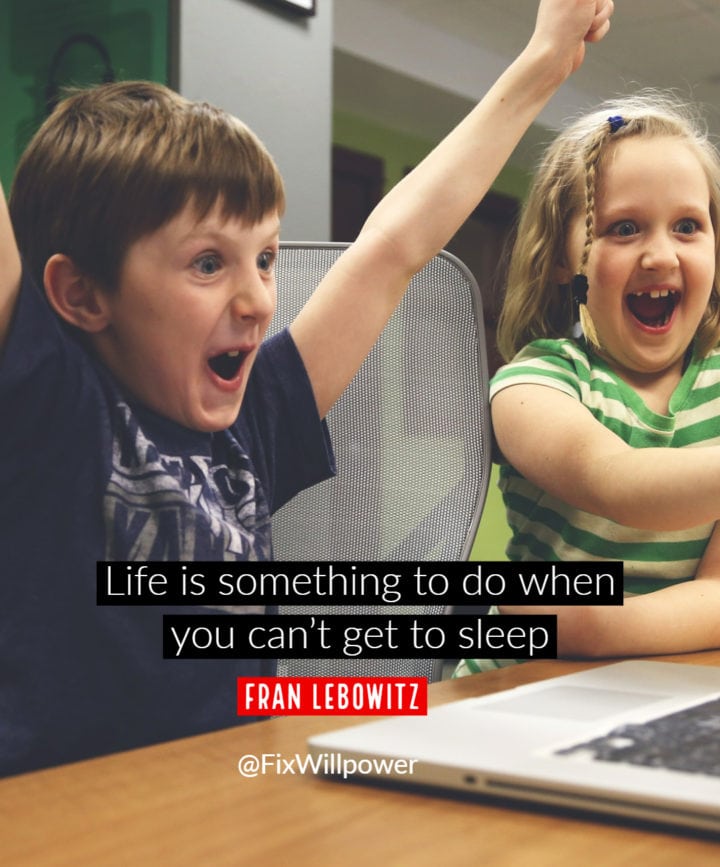
Life is something to do when you can’t get to sleep – Fran Lebowitz
Do you want to be THE MAN? Go to sleep
Five hours of sleep decreased the testosterone levels by 10 to 15 percent. The young men had the lowest testosterone levels in the afternoons on their sleep-restricted days, between 2 pm and 10 pm. Eve Van Cauter, Ph.D., professor of medicine.
Van Cauter laboratory has published several studies about the metabolic and hormonal consequences of sleep loss. These results suggest you might want to sleep more:
- Study showing that a significant sleep debt could trigger metabolic and endocrine changes similar to many of the hallmarks of aging (1999).
- Study found that inadequate sleep could foster insulin-resistance, a risk factor for Type 2 diabetes (2001).
- A study indicating that sleep deprivation could slow the response to vaccination, suggesting that sleep loss could reduce the ability to fight off an infection.
Too little sleep makes you sick.
Sleep deprivation has a direct impact on health. Our immune system just cannot work at the optimal level without sufficient hours of sleep. Nancy Baker, the associate director of Harvard University Health Services.
Not enough sleep makes you emotionally unstable.
When students are functioning on only three hours of sleep, they will often experience extreme mood swings and impaired judgment. Elizabeth Kensinger, a professor in the Harvard psychology department.
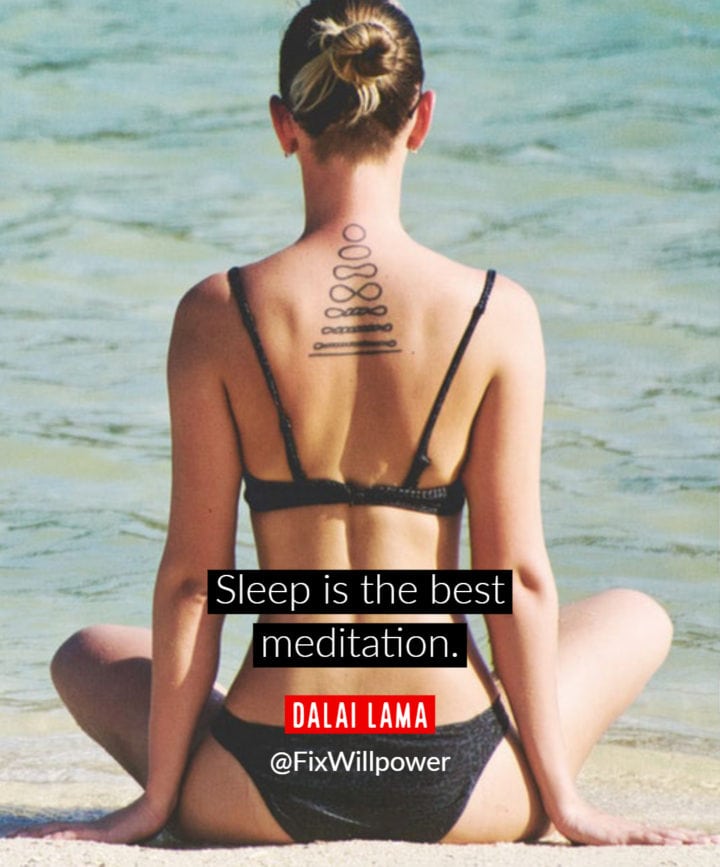
Sleep is the best meditation – Dalai Lama
No sleep makes you less alert.
First and foremost, sleep deprivation impairs attention and working memory, but it also affects other functions, such as long-term memory and decision-making. Partial sleep deprivation is found to influence attention, especially vigilance. Paula Alhola and Päivi Polo-Kantola.
Not sleeping will degrade your performance.
After 17-19 hours without sleep, corresponding to 2230 and 0100, performance on some tests was equivalent or worse than that at a blood alcohol concentration (BAC) of 0.05%. Response speeds were up to 50% slower for some tests, and accuracy measures were significantly poorer than at this level of alcohol. After extended periods without sleep, performance reached levels equivalent to the maximum alcohol dose given to subjects (BAC of 0.1%). A Williamson and A. Feyer.
Sleep deprivation is like an illness, it’ll make your performance lower, and sometimes you don’t even understand what’s happening. Centers for Disease Control and Prevention estimate that 30 percent of adults in the United States sleep less than six hours on average. Not enough sleep has huge consequences.
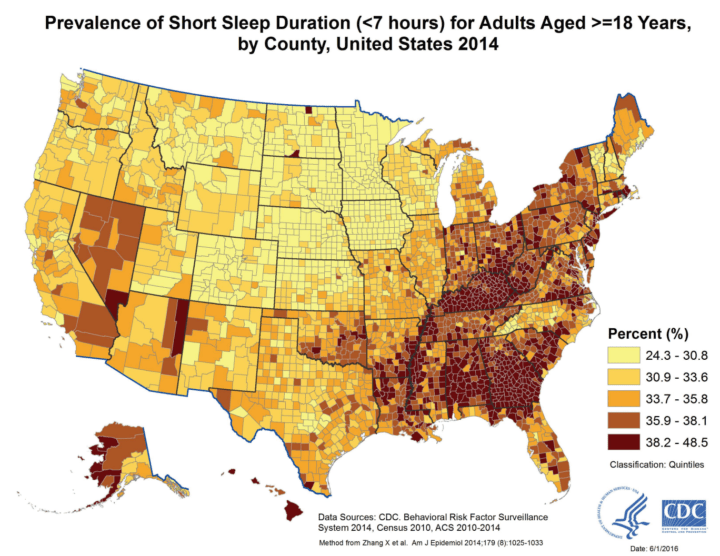
Figure 2. Prevalence of Short Sleep Duration (<7 hours) for Adults Aged ≥ 18 Years, by County, United States, 2014.
How to get people to sleep more
- Healthcare providers should routinely assess patients’ sleep patterns and discuss sleep-related problems such as snoring and excessive daytime sleepiness.
- Healthcare providers should also educate patients about the importance of sleep to their health.
- Individuals should make getting enough sleep a priority and practice good sleep habits.
- Employers can consider adjusting work schedules to allow their workers time to get enough sleep.
- Employers can also educate their shift workers about how to improve their sleep.
Are you getting enough sleep?
| Age Group | Recommended Hours of Sleep Per Day1,2 | |
|---|---|---|
| Infant | 4-12 months | 12-16 hours per 24 hours (including naps) |
| Toddler | 1-2 years | 11-14 hours per 24 hours (including naps) |
| Pre-school | 3-5 years | 10-13 hours per 24 hours (including naps) |
| School Age | 6-12 years | 9-12 hours per 24 hours |
| Teen | 13-18 years | 8-10 hours per 24 hours |
| Adult | 18-60 years | 7 or more hours per night |
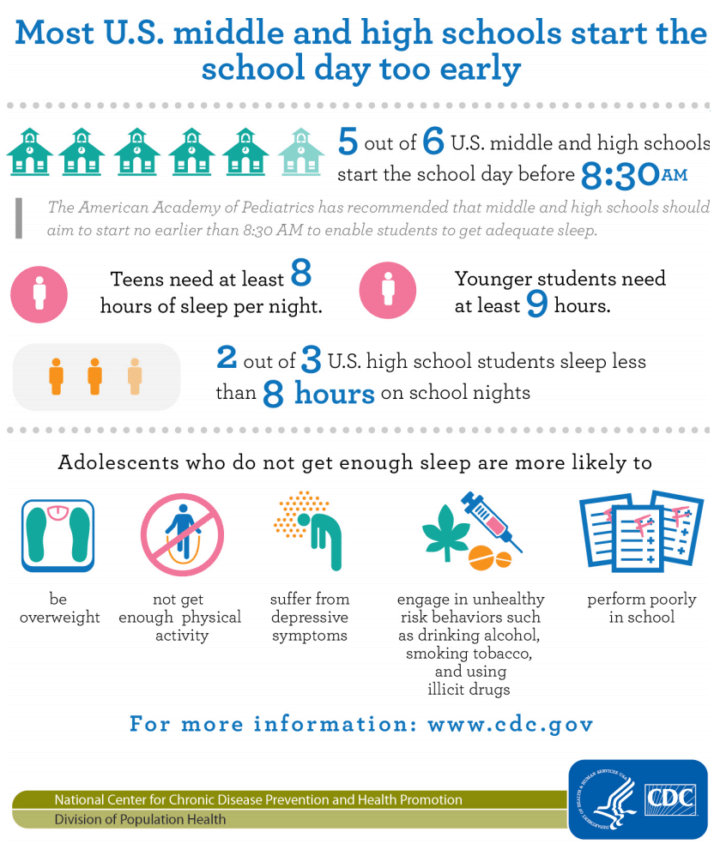
You should get 7 to 8 hours of sleep every night.
No excuses!
Sleep more to improve your life. When you sleep less, your performance will be lower, and that negates the extra hours you gain by depriving yourself of sleep. What time do you have to get up? Subtract a minimum of 8 hours and get to bed at that time. If you have to get up at 7 AM, you need to go to sleep at 11 PM. Although you should sleep more, then waking up early also improves your life.
What if you can’t sleep?
If you are one of those unfortunate people who have problems sleeping, then you should make fix it. Sleeping is so vital that before you attempt any other willpower feats fix your sleeping pattern.
I know some people who have to resort to sleeping pills often or even daily. Sleeping pills are not an optimal solution. Science of sleep shows that there’s a difference between being knocked out by pills and natural sleep.

Sleep is that golden chain that ties health and our bodies together – Thomas Dekker
Now, go to bed on time today.
Seriously!
____________________________
Image: RD & KD BFF by Kevin Dooley
![Read more about the article Learn Every Day 👩🎓 [3 Ways to Improve Yourself in 2024]](https://fixwillpower.com/wp-content/uploads/learn-every-day-429x314.jpg)

![Read more about the article What are the Most Important Things in Life? [2024]](https://fixwillpower.com/wp-content/uploads/important-things-in-life-429x314.jpg)

Pingback: Improve Your Life #26: Make a List of Your Interests | Fix Willpower